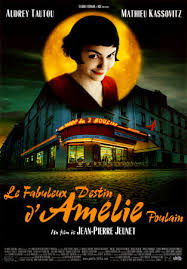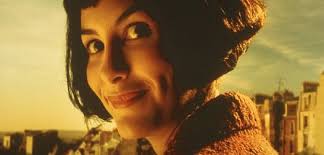In my previous post, I mentioned how Wes Anderson was a distinguished visual director. French director Jean-Pierre Jeunet, who directed and co-wrote Amelie, also falls into this description. As I've said before in my review of his follow-up to this film, A Very Long Engagement, Jeunet shoots his films in a hyper-real style that makes the entire world into his own quirky, surreal world. There's a burst of optimistic energy in every shot, even when he's highlighting the darkness of reality. Its because of that last bit that I have trouble truly enjoying Jeunet's films; the contradiction of his visuals with a scene's darker material makes it difficult to tonally negotiate what's happening to the characters. Take, for example, the scene in Amelie when Amelie (Audrey Tautou) struggles with the idea that, despite the good works she's doing for everyone, she may spend the rest of her life alone. The scene, and Tautou's performance, call for a very human touch, but Jeunet's kinetic style doesn't stop. It never lets us feel her pain, but rather creates a quirky montage that runs contrary to what should be felt.


I probably shouldn't have spent so much time talking about Jeunet's direction at the beginning, but the film is so much his creation that it has to be acknowledged. His script, which he co-wrote with Guillaume Laurant, sparkles with warmth and humanity; its easily the best part of the film. The film tells the story of Amelie Poulin, a precocious Parisian who discovers a stash of old toys in her bathroom, and sets out to return them to their owners. Over the course of the film she improves the lives of all those around her and tries to identify a mystery man whose pictures keep showing up in a train station photo booth.
Tautou
For the most part, Jeunet's style works well with this movie. Since the script pops with so much optimism, his visuals only improve the story. Credit frequent Jeunet cinematographer Bruno Delbonnel for creating the exquisite shots that have drawn much of the film's praise. And Tautou plays Amelie with a wink and a smile; she's a pure-hearted Parisian pixie who's out to improve her world. But the film can teeter on the side of too-cute, but these moments are few. For the most part, its a notable work of French cinema, and perhaps the best pairing of director and material in Jeunet's career.
Comments